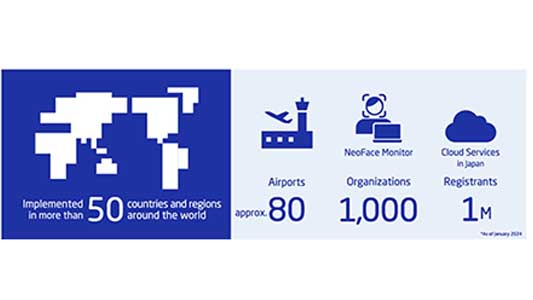TOKYO – NEC Corporation has announced that its face recognition technology has been ranked the world’s most accurate in a benchmark test(1) conducted by the globally recognized U.S. National Institute of Standards and Technology (NIST)(2).
In this benchmark test, NEC received the highest performance evaluation in “1:N Identification,”(3) which consists of still images of 12 million different people, by achieving an authentication accuracy rate of 99.88%.
NEC also ranked first in three other tests(4) – including an aging effects test, in which photos taken more than 10 years prior were used for identification – and placed in the top three in all categories of the Face Recognition Technology Evaluation (FRTE) 1:N Identification leaderboard that are posted on the NIST website.
Since beginning participation in 2009, NEC has ranked first in the world multiple times in the “1:N Identification” test, which calls for the highest accuracy of all of the face recognition benchmarks conducted by NIST(5). While working to improve the performance of its core algorithm, NEC has simultaneously rolled out real-world implementations of face recognition, and its face recognition business now operates in more than 50 countries and regions around the world.
NEC face recognition technology has been implemented at approximately 80 airports worldwide and is used in applications including immigration, customs, boarding procedures and customer service. These applications have become one of the primary use cases of face recognition technology. In addition, more than 1,000 organizations have adopted NeoFace Monitor, a system that allows users to log in to their devices using face recognition, improving both security and convenience(6). NEC also continues to be an industry leader in the provision of face recognition cloud services, including more than 1 million registered users in Japan.
Going forward, NEC’s aim is to increase real-world adoption of its portfolio of biometric authentication systems, “Bio-IDiom(7)” which includes face recognition as a core component. NEC will continue to develop and provide solutions for a wide range of use cases, including multimodal biometric authentication(8), which combines face and iris recognition to reduce false positive rates (the likelihood of authenticating the wrong person) to less than 1 in 10 billion, and gateless access control(9), which will improve ease-of-use by accurately authenticating multiple people at the same time. In addition, NEC anticipates the growth of a “self-sovereign society” in which people control their own personal information and will increase its commitment to new business in the web3 space, leveraging technologies such as decentralized identity and blockchain.

NEC is thoroughly committed to following the NEC Group AI and Human Rights Principles(10) in its use of AI, biometric data, and other data, placing the highest priority on privacy and respect for human rights.












